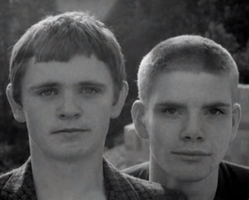Five Go Down to the Sea? | |
|---|---|
 Ricky Dineen and Finbarr Donnelly in the late 1970s | |
| Background information | |
| Origin | Cork, Ireland |
| Genres | Post-punk |
| Years active | 1978–1989 |
| Labels | Reekus Records Abstract Sounds Kabuki Records Creation Records Setanta Records |
| Past members | Finbarr Donnelly Ricky Dineen Mick Finnegan Philip O'Connell Keith O'Connell Giordaí Ua Laoghaire Mick Stack Úna Ní Chanainn Daniel Strittmatter Maurice Carter |
| Website | nunfivebeethoven |
Five Go Down to the Sea? were an Irish post-punk band from Cork, active between 1978 and 1989. Vocalist and lyricist Finbarr Donnelly, guitarist Ricky Dineen and brothers Philip (bass) and Keith "Smelly" O'Connell (drums) formed the band as Nun Attax while teenagers. They became known for Donnelly's absurdist, surreal lyrics and stage presence, Dineen's angular guitar and their Captain Beefheart-style rhythm section. The group changed their name to Five Go Down to the Sea? after moving to London in 1983. Their line-up has at times included guitarists Mick Finnegan, Giordaí Ua Laoghaire, Mick Stack, and the cellist Úna Ní Chanainn.
Dineen was influenced by bands such as the Mekons and the Fire Engines and wrote most of the riffs.[1] After achieving a following in Ireland in the early 1980s, they changed their name in 1983 and recorded the Knot a Fish EP. Five Go Down to the Sea? moved to London later that year, where they developed a live following. Although they never secured a recording contract for an album, they released further EPs. They found no commercial success or manager; in 1985, disillusioned with the music scene, they split up. Donnelly and Dineen re-formed in 1988 as Beethoven, and released the EP Him Goolie Goolie Man, Dem the following year. Their re-formation was short-lived, as Donnelly drowned accidentally on 18 June 1989, aged 27.
Although Five Go Down to the Sea? only released four EPs and did not sell many records, their reputation has grown over time. They influenced later generations of Irish musicians, especially a number of later dryly humorous Cork bands. In 2001, broadcaster Paul McDermott produced Get That Monster Off the Stage, a radio documentary about Finbarr Donnelly and his bands. In a 2017 interview, writer Mark McAvoy acknowledged that Donnelly "probably would have been the most influential musician and songwriter in terms of the Cork music scene and the bands that stemmed from it."[2] A compilation album Hiding from the Landlord was released in 2020.
- ^ McAvoy 2009, p. 56.
- ^ Roy 2017.
© MMXXIII Rich X Search. We shall prevail. All rights reserved. Rich X Search
